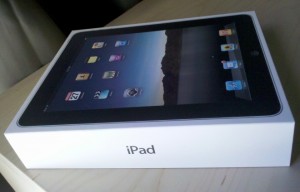The iPad was initially launched as a device targeting the consumer market. Many commentators and pundits refer to it as a media consumption device. Apple themselves call it a magical and revolutionary product, with typical Apple hyperbole. Although, after a few minutes of use, it certainly feels magical and the reaction it’s caused has been something of a revolution.
Exactly how much of a revolution? iPad sales are one important indicator. Apple releases sales figures during its quarterly financial reports. The list below shows the dates and totals of Apple’s announcements of iPad sales.
21 July 2010 – 3.27 million
31 May 2010 – 2 million
3 May 2010 – 1 million
8 April 2010 – 450,000
5 April 2010 – 300,000
Considering that the iPad was launched on April 3, the sales figures are record breaking. Updated sales figures will be released during the October 18, Apple fourth quarter results announcement.
The other indicator of a revolution is the rush of recent press releases from other vendors, describing their entry into the tablet device market. No one wants to get left behind in the race to dominate this newly created category.
While tablet computers have been around for many years, Apple, I feel, have redefined this category. The tablet computer category of old, as defined by Microsoft, tried to squeeze the Windows operating system into a tablet format. While the Windows tablet found modest success in niche markets, it was not a mass market success.
Apple has with the release of the iPad, shown that there is a market for a tablet like device, especially for web browsing, watching movies, listening to music and reading electronic books. In addition there is an ever increasing range of 3rd party applications, or Apps, as they are fondly called, being developed for the iPad.
While all the attention has been on the iPad as a consumer device, it’s the steady adoption by businesses that has been most surprising. Even Apple, who for many years, have all but ignored the business market, outside of specialist creative and media niches, has recently showcased the iPad for business use.
Mercedes Benz, Hyatt Hotels, Wells Fargo and SAP are some of the larger organisations that are testing out the iPad enterprise wide.
In the UK, Lloyds of London, the insurance brokers are conducting a pilot program, where the iPad will replace the mainly paper based workflow that the insurance broker currently uses. I was at a meeting recently at a UK Building Society, who are investigating using the iPad for board meetings.
I have started noticing an increasing number of people starting to use the iPad during meetings or at conferences. While there are some limitations, the iPad certainly works well as a replacement for using a notebook in a meeting.
The commonly held view that the iPad is only for consumer use and mainly a niche entertainment device is incorrect, in my opinion. I believe that the iPad is poised to take the business world by storm.
Building on the solid foundations established for the iPhone, the iPad is really the first mobile computer designed from the ground up to be operated by touch. For anyone that requires Netbook like computing capability with a higher degree of mobility, then the iPad is ideally suited to that. Apple will no doubt make the iPad lighter, faster and more capable with future versions.
Businesses are always looking for ways to improve efficiency. Any area of a business that has a manager walking about, a sales person showing customers the latest car, an estate agent required to provide quick details to a client will see the value of using an iPad.
Then there is the untapped potential. The many new use cases for a device like the iPad, yet to be fully realised, will further increase it’s adoption by business users.
